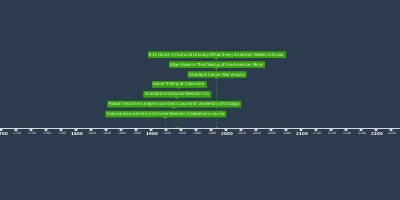Leo Strauss (20 dic 1949 anni – 7 ottob 1969 anni)
Descrizione:
He had a brief stint at Columbia earlier and was friends with Jacob KleinRobert Maynard Hutchins Distinguished Service Professorship at Chicago
Committee on Social Thought
University in Exile (aka New School for Social Research)
Recollction of Strauss as teacher (see also Geier) by Bluhm. https://philosophynow.org/issues/55/Leo_Strauss_Tributes_And_Reflections
"During the last ten years or more, a considerable literature has appeared that sets forth a variety of views about the political stance of Professor Leo Strauss, who taught for many years at the University of Chicago. Perhaps this is because his name has gotten tied up with those of a number of neo-cons, especially some members of the Bush administration, such as Paul Wolfowitz and Daniel Pearle, who planned and justified the Iraq war and who are sponsors of the contemporary idea of America as an imperial power. Strauss has also been called “a Nietzsche with the mask of Burkhardt” (Michael Platt), and even a fascist. His work as decipherer of secret writings in many of the classic works of political theory led to the charge that the professor himself wrote in such a way as to veil his real meaning. This has lent cogency to the statements that his true political opinions were extremist. A more innocent view of Strauss’ scholarly intention is of Strauss as a thinker who used rational discourse (dialogue) to explode the prejudices of conventional thought and move minds towards an understanding of the whole. In this image he appears more like John Stuart Mill.
"My own recollection of Leo Strauss as a teacher is different from either view. I never detected extremist opinions, either in his teaching or in his writings, at any level of complexity.
"His stress in seminars I attended, and also in his writings, was on excavating the intention of the author we were studying and to strip away all interpretations that reduced a great writer to an expression of the culture of his time. In my experience Strauss’ interest was always to get at an author’s central and original intention, which he read as an intention to display universal human nature, universal political motives and typical patterns of political action – a truth about the political that transcends the culture of the everyday, the received truth of a particular time and place.
"An example of this method is found in the fact that Strauss always kept in front of him a copy of the work we were studying in its original language. Thus in a seminar on Machiavelli’s Discourses I remember him constantly correcting the translator of the edition we used in class when the translator rendered the Italian word virtu as ‘capacity’, ‘strength’, ‘vigor’ or some such word. “No”, Strauss would say, “Machiavelli meant to say ‘virtue’, pure and simple.” Machiavelli was redefining the word, attempting to get rid of Aristotelian connotations. He was overthrowing the tradition of ‘virtue’ and establishing a new meaning for the word – or rather the old meaning of the word, which is as old as Thucydides.
"Strauss’ concern for understanding secret writing flowed from his belief that the great writers of philosophy veiled their true meanings because the truth at which they aimed would invariably threaten the established regime. This idea rested on the assumption that all regimes rely on a legitimizing myth which is different from the truth of the matter about human nature. Stability requires such myths, and therefore philosophy, which seeks the truth simply, can be subversive. Philosophers therefore do not write for the general public, but for one another, for persons who understand how to veil their own thought and how to uncover that of their peers.
"I have applied this method in three published works: an article on the form of government that Aristotle terms ‘Polity’ in his Politics; an article on Locke’s idea of God; and in an essay on Descartes in the introductory chapter to my book, Force or Freedom? The Paradox in Modern Political Thought. I have also applied it in a paper on Aristotle’s theory of slavery that I delivered at a meeting of the American Political Science Association, which I have not published. In each case my reading of the author’s true intention is widely different from what it is generally accepted to be.
"Strauss’ way of reading the classic texts profoundly affected the way I taught political theory, for almost forty years following my graduate work at the University of Chicago. I did not teach certain books as ideologies – Locke as prime exemplar of liberal republican thought, for example – but as alternative frameworks for fundamentally understanding political regimes. In each case I found it important to show the connection between a particular political doctrine and the metaphysical and epistemological basis on which it rested, and then to compare and contrast these philosophies as alternative ways of understanding political reality, indeed, as alternative philosophies of life. Strauss taught me how to study political theory as alternative truths about the political world, indeed, as alternative truths simply. In each case I used the writer – Thucydides, Plato, Aristotle, Augustine, Locke, Hobbes, Marx, Nietzsche – to hold up a mirror to the governing ideologies of our society, and especially to the political science of our time. It was in each case an effort to get beyond opinion towards knowledge. Strauss taught me how to think.
© William T. Bluhm 2006
Willliam Bluhm is Professor Emeritus of Political Science, University of Rochester (N.Y.)
Aggiunto al nastro di tempo:
Data:
20 dic 1949 anni
7 ottob 1969 anni
~ 19 years
